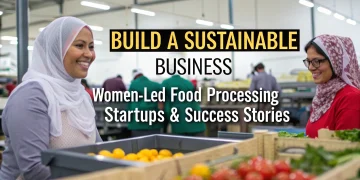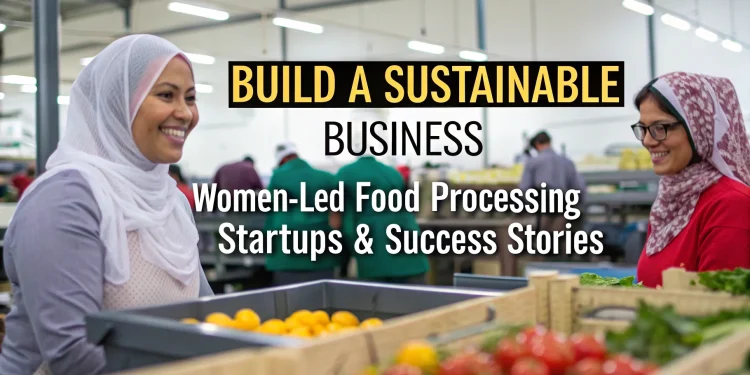The food processing startups in India is not just about nourishment—it’s about empowerment, innovation, and sustainability. And at the heart of this transformation are women entrepreneurs who are rewriting the rules of the game. Across rural and urban India, women are leading food processing startups that are not only profitable but deeply rooted in community development and inclusivity.
From millet-based health foods and pickles to ready-to-eat snacks and cold-pressed oils, women-led startups are creating sustainable business models—supported strongly by government schemes such as the PM Formalization of Micro Food Processing Enterprises (PMFME) and PM Kisan SAMPADA Yojana.
According to the MoFPI Annual Report 2023–24, more than 50% of PMFME beneficiaries are women, proving that the sector is increasingly female-led and future-ready.
Food Processing Startups: A Sector Full of Opportunity
India’s food processing startups plays a vital role in its economy. As per the 2023–24 MoFPI Annual Report:
- Agri-food exports crossed USD 46.43 billion
- The sector contributed 7.66% of total manufacturing GVA
- 51.11 lakh workers are engaged in unorganized food enterprises
- The sector is growing at a CAGR of 5.35%, outpacing overall agriculture (4.46%)

Related: Why Now Is the Best Time to Launch a Food Startup in India
Why Food Processing Is a Natural Fit for Women Entrepreneurs
The following points capture the local knowledge of traditional recipe innovation in ethnic and regional products:
Women-Led Startups Impacting the Food Sector
- Organized strong community networks
- Self Help Group (SHG) led clusters with shared infrastructures
- Focused on sustainability and health: millet snacks, vegan products, organically produced pickles
- Efficient resource management: lower production costs through reduced wastage
Women’s Participation in PMFME Scheme
The PMFME Scheme provides a 35% credit-linked capital subsidy (max ₹10 lakh) for setting up or upgrading micro food processing enterprises with a set limit of ten lakh rupees.
Who can benefit?
- Individual entrepreneurs (women-led)
- Self-Help Groups (SHGs)
- Farmer Producer Organizations (FPOs)
- Cooperatives
Women Participation Snapshot 2023-24
| Category | Participation (%) |
| Individual Women Beneficiaries | 52% |
| Women SHGs | 25% |
| Women Cooperatives | 10% |
| Others (NGOs, rural collectives) | 13% |
(Source: MoFPI Annual Report 2023-24, PMFME section)
Success Stories
Vijaya from Telangana – Millet Magic Snacks
Vijaya started her millet-based snacks business under PMFME with a grant of seven lakhs. Now, more than sixty organic stores in Hyderabad and Bengaluru stock her products.
Highlight: Training from NIFTEM and FSSAI certification.
Fathima from Kerala – Banana Chips Exporter
With the aid of MoFPI and Kerala’s ODOP initiative, Fathima transformed her home-based banana chips business into a unit exporting to Gulf countries.
Highlight: Built a food drying facility with solar power and received a subsidy of ₹4.5 lakh.
Savita from Uttar Pradesh – Pickle & Sauce Unit
Operated by Savita, the enterprise has 28 women employees and produces 500 kg/day of pickles and tomato sauces. With the assistance of NABARD and PMFME, her enterprise has sales over ₹1 crore per year.
Highlight: Grown in ODOP clusters, uses local mango, chili, and turmeric.
Women Entrepreneurs Empowered Through Government Schemes
| Scheme | Key Benefit |
| PMFME Scheme | 35% Capital Subsidy, training, and branding support. |
| MoFPI R&D Assistance | Grants for women’s innovative food products. |
| Mega Food Parks (Women SHGs) | Shared infrastructure and incubation centers. |
| Backward/Forward Linkages | Funding provided for market and raw material connectivity. |
| ODOP + PMFME Convergence | Region-specific raw material support. |
Related: Top 10 Government Schemes for Food Processing Startups in India
Trends of Women-Led Startups in Food Sectors by Segments
| Segment | Key Products | Growth Potential |
| Millets & Traditional Grains | Ragi biscuits, bajra laddoos | High (domestic + export) |
| Fruits & Vegetables | Pickles, sauces, dehydrated fruits | Medium to high |
| Dairy | Paneer, ghee, curd | High |
| Meat & Marine | Value-added meat, dried fish | Moderate |
| Beverages | Herbal teas, juices, flavored water | High |
Compliance, Training & Branding Support
Training
MoFPI sponsors training through NIFTEM, IIFPT, and other state-level institutions. Focus areas for women entrepreneur training include:
- Food Safety
- Packaging innovation
- Business management
- Marketing
Branding & eCommerce
Women entrepreneurs are featured at:
- ODOP and state-run marts e-commerce stalls
- NAFED Bazaars
- Global exhibitions supported by APEDA, MoFPI
NPCS’s Role in Women Enterprises
NPCS assists women entrepreneur clients in the food sector with specialist direction. Women’s issues are addressed with dedicated solutions like:
- Compilation of a Market Survey Along With Techno Economic Feasibility Reports
- Study of the production activities, materials, the plant’s layout, and the financial aspects
- In-depth evaluation of the processes and scrutinizing the materials, plant layout, and finances
- Assessing funding plans and scaling up operations for women-led businesses
NPCS has a guide for every type of business, from exploring herbal tea businesses to specialized millet processing lines.
Checklist for Women Entrepreneurs Initiating a Food Processing Venture
| Requirement | Importance |
| Business Registration | Eligibility to apply for grants |
| DPR (Detailed Project Report) | Key document for receiving help under PMFME and from MoFPI. |
| Land or Lease Agreement | Necessary to access grants for fixed capital investment. |
| FSSAI Certification | Compliance requirement for the food industry. |
| Bank Term Loan | Required for credit-linked subsidy under PMFME. |
Frequently Asked Questions (FAQs)
Q1: Are homemakers eligible for PMFME subsidies?
Absolutely. Anyone 18 years and older with a reasonable plan can register to receive support under the scheme.
Q2: I do not have land to set up a unit, what now?
MoFPI supports common facilities through clusters and Mega Food Parks which allows you to lease space in these zones.
Q3: Are SHGs eligible to receive marketing assistance?
SHGs are entitled to market branding and packaging, as well as market link support under convergence schemes.
Q4: Do you provide assistance in preparing a DPR?
Yes, NPCS will assist you in preparing professional project reports, as well as undertaking technical and financial feasibility studies.
Q5: What is the initial investment required to establish a micro food unit?
It can be as low as ₹2–3 lakh, especially with government backing and for home-based or cluster-oriented setups.
Conclusion: It’s Her Time to Lead
Women entrepreneurs are reimagining the Indian food processing sector with innovative, sustainable, and scalable solutions that draw from local knowledge. Coupled with government measures, subsidy programs, and increased demand for traditional and health-focused foods, the time has never been more opportune for women’s leadership.
This is for every woman who has a recipe, an idea, or a vision. The kitchen is your starting point, but your destination is the world.


















